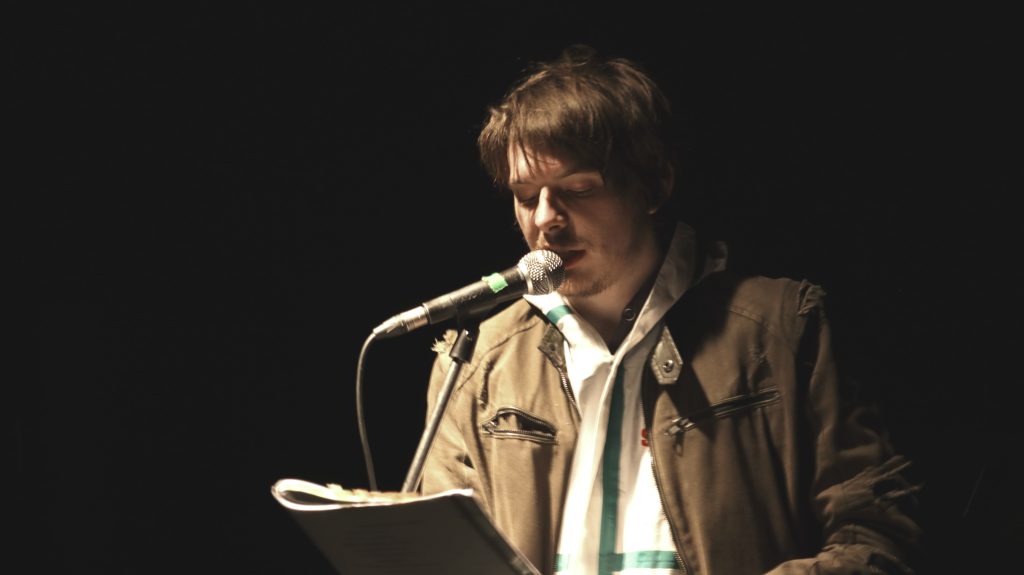November 20, 2020 – Although slam poetry is not so common in Croatia, its scene is very much alive. A young journalism student Ivor Zvonimir Kruljac talks about his experience as a slam poet and about slam poetry in Croatia.
When I met Ivor five years ago, he was a freshman at the Faculty of Political Science in Zagreb, studying journalism. As much as I remember, Ivor was a very talented writer and a keen journalist. But what I didn’t know about Ivor is that long before journalism, he had a passion for poetry.
“I started writing poetry when I was 15 (in 2012) as advised by my chemistry professor to practice my handwriting. I liked poetry as a way of expression and the writing itself to the point I wanted to pursue it as work,” explains Ivor, adding that thanks to writing poetry and articles for the school newspaper, he ended up in journalism. He later honed his journalistic talent in the student newspaper Global, web portals Time Out Croatia and the Norwegian Standard, and some other publications.
An unusual hobby
However, in the last few years, he has been engaged in writing slam poetry, and regularly participated in slam poetry events in Croatia, where he performed some of his poems, both in Croatian and in English. Slam poetry is not as popular in Croatia as it is in America where it originated, so it’s not usual to hear that someone in Croatia is writing slam poetry.
By definition, slam poetry is an artistic event in which poets themselves read their poetry in front of a live audience and judges. It originated in the 1980s in Chicago as an expression of rebellion against classical poetry that was considered elitist and rigid. The aim was to bring poetry, which was intended for an academic audience, closer to a wider popular audience.
“The slam poetry scene in Croatia remains underground, associated with alternative culture, but it’s alive and vibrant. More and more people in Croatia are familiar with slam poetry. Famous Croatian theatre and movie director Mario Kovač is one of the people who started slam poetry in Croatia 20 years ago,” says Ivor.
Ivor Zvonimir Kruljac / Photo Nilas
The topics may be various, from social, political, to personal, but what’s more important, the poems must be interpreted energetically and passionately on the scene to attract the audience’s attention. In contrary to “ordinary” poetry, slam poetry strives to initiate a live audience’s reaction, and it is graded and awarded by that audience. Also, rhyming is considered juvenile, and free verse is more appreciated.
Ivor says his verses are sometimes funny, light, and cheerful, but sometimes are even depressing and angry, with a swear word or two. Apart from poetry in Croatian, he publishes poems in English exclusively on the site Medium, where he freshly published a new poem called “Tripful thinking”. The feedback on his poetry among other poets was mixed at first, but over the years, his slam poetry found more and more space at various poetry events in Croatia.
“There is certainly an audience for my poetry, backed with sites that publish my work and with people coming to slam performances. Writing poetry really is a hobby to me and I’m not trying to make money from it, so that gives me the liberty of not really bothering with the question of whether people like my poems which is the perk of truly free artists,” considers Ivor, adding that he wants to live from decent and fair journalism, which is his profession.
‘The most genuine and subjective way of expression’
Although he considers slam poetry a hobby, he already published three books of poems. At his recent performance in Zagreb’s club Močvara, he presented his third digital book of poems named “Intelektualna kruljenja” (translated as “Intelectual growling”, as growling is also a wordplay on his surname in Croatian, but it loses a bit in English translation).
He was accompanied by two fantastic musicians, Daisy Dives (a truly fantastic Croatian dream-pop diva) and Dino Saurić (indie musician), but only after his recitation, because, according to the rules of slam poetry, it is forbidden to have a musical accompaniment.
Ivor Zvonimir Kruljac at one of his last slam poetry performances in Zagreb’s club Močvara, wearing a protective suit that professionals use while they disinfect areas, which was his way of expressing respect for them and showing responsibility in a fight with the coronavirus pandemic. / Photo Nilas
His new poetry, just like his previous two books “Nebuloze” (“Nonsensicals”) from 2017 and “Psihodelije” (“Psychedelics”) from 2018, is published as a free digital copy. As he says, he would continue to write poetry even if there are no ways of publishing it or having any public reach.
“I always hope that by presenting my work publicly, people might find consolation, entertainment, and other good feelings to make their day better. Basically, poetry is the most genuine and subjective way of my expression,” says Ivor, whose books were quite recently even added to the digital collection of the National and University Library in Zagreb.
Slam poetry in Croatia
Although it has its roots in America, slam poetry competitions are held around the world. In Croatia, the 6th championship in slam poetry was held this year, and the winner was Hrvoje Mimica under the artistic name MC Deda. As the state champion, he will represent Croatia at the European slam championship in Maribor. Along with Zagreb’s club Močvara, where the state championships are held, the co-organizer is an art collective from Split named DADAnti, led by Croatian slam poet Franko Bušić. Apart from Močvara, slam poetry nights are also held in clubs such as Vinyl and former Jiggy bar.
Ivor says he had the honour to perform with other fantastic slam poets: Dino Tremens, Zlatko Majsec, Dijana Ćurković, Aleksandra Mandić, Luka Antić, Željko Barišić, Hrvoje Bubić, and many more.
“Slam poetry community is a safe place where your poetry can be joyful, rude, polite, hilarious, angry, depressing, and everything else. The leading philosophy is ‘don’t worry about its quality, it only matters that it’s yours’, and quite often we give a chance to people in the audience to come on stage and join us with reciting their own poetry,” explains Ivor.
This year, the organizers of slam poetry events are paying attention to compliance with epidemiological measures and so far, they have not recorded any infections at their events.
To read more about lifestyle in Croatia, follow TCN’s dedicated page.











